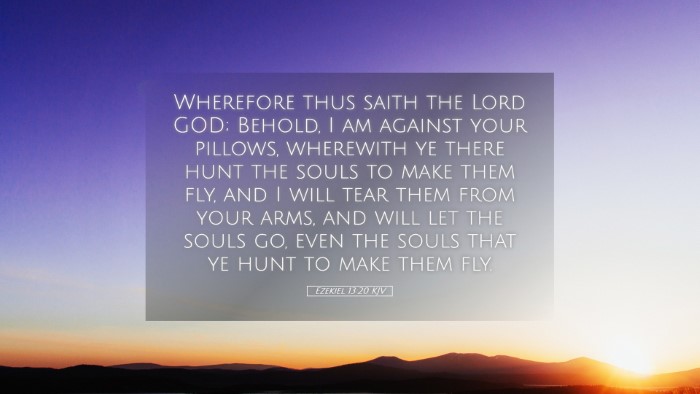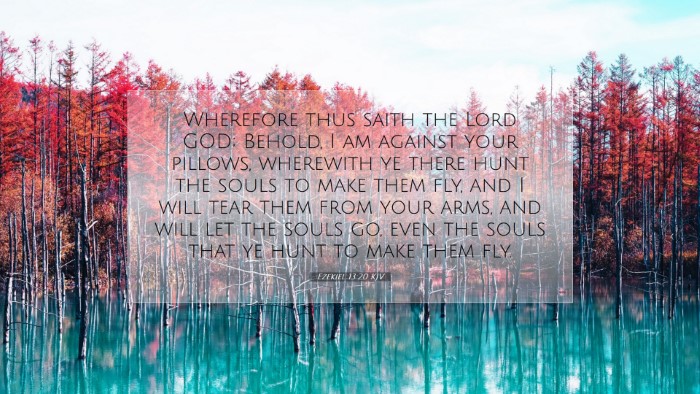Bible Commentary on Ezekiel 13:20
Ezekiel 13:20: "Wherefore thus saith the Lord God; Behold, I am against your pillows, wherein ye there hunt the souls to make them fly; and I will tear them from your arms, and will let the souls go, even the souls that ye hunt to make them fly."
This verse presents a profound condemnation of false prophets and misleading spiritual leaders in Israel during Ezekiel's time. The imagery of "pillows" used in this text serves as a significant symbol of comfort and false security provided by these leaders to the people, lulling them into a false sense of safety.
Contextual Analysis
The historical context of Ezekiel's ministry during the Babylonian exile is crucial for understanding this verse. God’s people, grappling with despair and uncertainty, sought reassurance from prophets who misrepresented divine truths. Ezekiel’s prophecy was a corrective to this deceit.
Insights from Public Domain Commentaries
Matthew Henry's Commentary
Matthew Henry emphasizes the gravity of the situation, noting that these "pillows" symbolize the false teachings that provide comfort without truth. He indicates that the comfort offered by these false prophets was not rooted in God’s word, thereby leading the people astray. Henry further points out that the act of "hunting souls" suggests a predatory nature of these leaders, where they prey upon the vulnerable instead of guiding them to true solace in God.
Albert Barnes' Commentary
Albert Barnes offers a detailed examination of the Hebrew terms used in this verse. He interprets the "pillows" as the superficial and ungrounded teachings which serve to pacify rather than to edify the people. Barnes highlights that the phrase "I will tear them from your arms" suggests a divine intervention to remove these false securities and bring a harsh awakening to the people. It reflects God's commitment to not allow His flock to remain in harmful ignorance.
Adam Clarke's Commentary
Adam Clarke provides a more poetic reflection on the imagery of this passage. He notes that the concept of "hunting souls" indicates a most grievous moral failure, where the leaders are metaphorically engaged in a process of seizing the souls of the innocent. Clarke's analysis reveals that the consequences of such spiritual malpractice lead not only to individual ruin but also danger to the community as a whole. God’s intention to "let the souls go" is presented as an act of liberation from deception.
Theological Reflections
This verse serves as a stark reminder of the responsibility that leaders carry in their spiritual accountability. Each commentary collectively underscores the debilitating effects of false teachings within the community of believers. The act of tearing away the pillows signifies a divine purge of deceptive doctrines, reinforcing the notion that God desires His people to be rooted in the truth.
Implications for Modern Ministry
- Examination of Teachings: Modern pastors must critically evaluate the teachings they share and ensure they align with Biblical doctrine.
- Emphasis on Authenticity: There is a call for authenticity in ministry—comfort offered must come from genuine engagement with Scripture.
- Protection of the Congregation: It is imperative to safeguard the flock from harmful influences, understanding the responsibility to guide rather than mislead.
Conclusion
Ezekiel 13:20 provides timeless insights about the dynamics of spiritual leadership and the crucial necessity of truth in ministry. Through the collective wisdom of Biblical commentators, we are reminded of the perils of allowing comfort to replace honesty and the importance of God’s unwavering commitment to truth. As leaders and scholars reflect on this passage, the urgency of integrity in worship and teaching cannot be overstated. In doing so, we adhere more closely to the call of our Lord, who desires for His people not merely to be comforted but truly liberated by His word.


